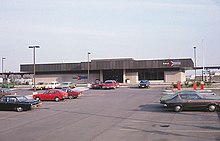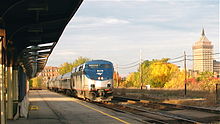| Rochester, NY | ||||||||||||||||||||||||||||||||||||||||||||||
|---|---|---|---|---|---|---|---|---|---|---|---|---|---|---|---|---|---|---|---|---|---|---|---|---|---|---|---|---|---|---|---|---|---|---|---|---|---|---|---|---|---|---|---|---|---|---|
 The new Amtrak station in October 2017 The new Amtrak station in October 2017 | ||||||||||||||||||||||||||||||||||||||||||||||
| General information | ||||||||||||||||||||||||||||||||||||||||||||||
| Location | 320 Central Avenue Rochester, New York United States | |||||||||||||||||||||||||||||||||||||||||||||
| Coordinates | 43°09′49″N 77°36′30″W / 43.1635°N 77.6082°W / 43.1635; -77.6082 | |||||||||||||||||||||||||||||||||||||||||||||
| Owned by | Amtrak | |||||||||||||||||||||||||||||||||||||||||||||
| Line(s) | Empire Corridor (Rochester Subdivision) | |||||||||||||||||||||||||||||||||||||||||||||
| Platforms | 1 island platform (formerly 6 island platforms) | |||||||||||||||||||||||||||||||||||||||||||||
| Tracks | 4 (formerly 11) | |||||||||||||||||||||||||||||||||||||||||||||
| Connections | ||||||||||||||||||||||||||||||||||||||||||||||
| Construction | ||||||||||||||||||||||||||||||||||||||||||||||
| Parking | Yes | |||||||||||||||||||||||||||||||||||||||||||||
| Bicycle facilities | Yes | |||||||||||||||||||||||||||||||||||||||||||||
| Accessible | Yes | |||||||||||||||||||||||||||||||||||||||||||||
| Other information | ||||||||||||||||||||||||||||||||||||||||||||||
| Station code | Amtrak: ROC | |||||||||||||||||||||||||||||||||||||||||||||
| IATA code | ZTE | |||||||||||||||||||||||||||||||||||||||||||||
| History | ||||||||||||||||||||||||||||||||||||||||||||||
| Opened | Original depot: 1914; 110 years ago (1914) Amtrak facility: July 12, 1978 | |||||||||||||||||||||||||||||||||||||||||||||
| Rebuilt | 2017 | |||||||||||||||||||||||||||||||||||||||||||||
| Passengers | ||||||||||||||||||||||||||||||||||||||||||||||
| FY 2023 | 130,121 (Amtrak) | |||||||||||||||||||||||||||||||||||||||||||||
| Services | ||||||||||||||||||||||||||||||||||||||||||||||
| ||||||||||||||||||||||||||||||||||||||||||||||
| ||||||||||||||||||||||||||||||||||||||||||||||
| ||||||||||||||||||||||||||||||||||||||||||||||
| ||||||||||||||||||||||||||||||||||||||||||||||
The Louise M. Slaughter Rochester Station is an Amtrak intermodal transit station in Rochester, New York. Local and regional bus transportation is provided by the Rochester-Genesee Regional Transportation Authority (branded RTS). Various taxi firms service the station, as well. The station is located on the north side of Rochester, just east of High Falls on the south side of the tracks.
Rochester is served by three Amtrak routes, totalling eight trains each day. The Lake Shore Limited operates one train in each direction daily between Chicago and Boston/New York City (via two sections east of Albany), while the Empire Service operates two trains in each direction between Niagara Falls and New York City, and the Maple Leaf serves the station with one train in each direction between Toronto and New York City. The station, opened in 2017, is the third train station to be built at the site.
History
Rochester has a long history of train stations. The first major Rochester station was built in 1845 by the New York Central Railroad on Mill Street by High Falls.

In the 1880s, the railroad tracks were elevated (having previously been at grade) and in 1882 the station was relocated to the east side of the Genesee River, close to the modern station site on Central Avenue at St. Paul Street. This station was notable for its large train shed. Not long after the 1882 station was established, the city of Rochester had four major train stations: The New York Central station; the since demolished Erie Railroad Depot; the Lehigh Valley Railroad Station that houses Dinosaur Bar-B-Que; and the Rochester terminal of the Buffalo, Rochester, and Pittsburgh Railway that houses Nick Tahou Hots.

The 1882 station would be demolished and replaced in 1914 at the modern site by the more famous New York Central station designed by Claude Fayette Bragdon. The station, often referred to as Bragdon Station, was four stories with three high arching windows reminiscent of train driving wheels and a main room that was reminiscent of New York's Grand Central Terminal complete with arched ceilings and a lunch counter. The station at its height had 6 island platforms connected to the main station building by two tunnels, one for passengers and one for baggage and mail that went all the way to the Cumberland St. Central Post Office. The station was seen as one of Bragdon's greatest architectural accomplishments. As was the case with several large stations of the era, with falling revenues and the high maintenance costs and taxes of such a large facility the station was sold by the New York Central Railroad in 1959 to a private owner.


In a move that is largely considered today to have been a mistake, the famed 1914 station was mostly demolished in 1965 after its sale to private owners except for the then run down western-most (one-third) portion which served as the station (with the ticket sales at the entrance to the passenger tunnel). That remaining section was demolished in 1977 to make way for a smaller Amtrak facility in 1978. The passenger, baggage tunnels and one of the platform canopies of the original 1914 building were the last remaining remnants of the previous 1914 station to survive. The tunnels were re-discovered during initial surveying work for the current station. During the construction of the station in 2015, the tunnels were filled in as part of the construction of a new tunnel for the station; the westernmost part of the canopy remains.
The 1978 structure was an Amshack style station similar to other stations Amtrak was building at the time as part of their Standard Stations Program. It opened on July 12, 1978. Its single track platform was shared by eastbound and westbound trains, which caused conflicts between passenger and freight trains and led to delays. In addition, its low-level platforms forced passengers to use steps when boarding and alighting. The 1978 station was intended to be temporary and was long outdated by the time it was demolished in late 2015 to make way for the current station.
Ground was broken for the current station and multimodal transit center on October 28, 2014. It opened on October 6, 2017, in a ceremony attended by Congresswoman Louise Slaughter, Mayor Lovely Warren and Governor Andrew Cuomo. The station's construction cost of $29.5 million (originally $26.5 million) was funded by the City of Rochester, State of New York, and Amtrak. Its construction occurred around the same time of two other Empire Corridor stations: Niagara Falls (2016) and Schenectady (2018).
On March 17, 2018, a day after Slaughter's death, Senators Chuck Schumer and Kirsten Gillibrand along with former Mayor and Lieutenant Governor Bob Duffy requested that Amtrak rename the station for Slaughter, who played a significant part in securing the funding for the rebuilt station. Four days later, Amtrak announced that it would rename the station, and officially unveiled the new name on March 25, 2019.
Station layout

The two floor station is 9,500 square feet (880 m). Designed to look like the original 1914 Bragdon station, it includes the 1914 station's original clock and plaques from both the 1914 station and 1882 station. Trains call at a single high-level center island platform serving one track in each direction for Amtrak, with two others on either side in each direction for freight traffic to pass by. The platform is connected to the station building via a tunnel underneath the tracks that is accessed by stairs, escalator and elevator. The station also contains two retail stands and many display boards.
To the side of the station is future parking allocation for Greyhound and Trailways buses, which currently stop at a temporary facility across the street as part of a phase 2 plan to directly incorporate buses into the station. It was also built to accommodate proposed high-speed rail service.

Bus connections
The station is across the street from a temporary New York Trailways station. Phase 2 of the train station, which is awaiting funding, is to include a bus station for Trailways, Greyhound, FlixBus and Megabus.
RTS service includes the 2 North Clinton and the 3 Joseph, both of which go to the nearby RTS Transit Center, approximately .4 mile south on Clinton Avenue, where numerous additional bus connections are available.
Immigration checkpoint
In 2010 U.S. Border Patrol agents boarded the trains at Rochester station and asked passengers for details of their citizenship. At that time passengers who were not able to suitably prove their right to be in the U.S. could have been removed from the train and taken into custody.
References
- "Amtrak Fact Sheet, Fiscal Year 2023: State of New York" (PDF). Amtrak. March 2024. Retrieved June 29, 2024.
- "Monroe County (NY) Library System - Pathfinders - Architecture - Lost Rochester". Archived from the original on September 24, 2015. Retrieved August 24, 2015.
- Evaluation of the 1914 Pedestrian and Baggage Subway Tunnel under CSX Running Tracks (PDF) (Report). Rochester, New York: Parsons Brinckerhoff. April 2012.
{{cite report}}: CS1 maint: url-status (link) - Rochester Gets New Station, Amtrak Week Proclaimed By Mayor Amtrak News August 1, 1978 pages 2/3
- "Rochester, NY (ROC". Great American Stations. Amtrak. Retrieved January 15, 2022.
- Manon, Tianna (October 6, 2017). "Rochester's new train station is open for business". wxxinews.org. Retrieved August 21, 2019.
- ^ Orr, Steve (October 29, 2014). "Ground broken for Amtrak station". Democrat & Chronicle. Retrieved December 21, 2014.
- ^ "Officials will break ground on Rochester train station in August". Democrat & Chronicle. April 3, 2013. Retrieved April 4, 2013.
- WHAM. "New York Senators call on Amtrak to rename Rochester train station after Louise Slaughter". WHAM. Retrieved March 17, 2018.
- Abrams, Jason (March 21, 2018). "Amtrak to Name Rochester Station in Honor of Congresswoman Louise M. Slaughter". Amtrak Media. Archived from the original on March 22, 2018. Retrieved March 21, 2018.
- Thompson, Howard (March 25, 2019). "Rochester train station renamed in honor of late Rep. Louise Slaughter". ROCHESTERFIRST. Retrieved March 25, 2019.
- Brown, James (March 25, 2019). "Rochester train station renamed after Louise Slaughter". wxxinews.org. Retrieved March 25, 2019.
- "Rochester Central Station clock back in city". Democrat & Chronicle. Associated Press. August 31, 2017. Retrieved August 21, 2019.
- "FAQs". New York Department of Transportation. Retrieved August 21, 2019.
- WHAM (March 8, 2024). "Push for a new long-distance bus terminal in Rochester gains momentum". WHAM. Retrieved March 11, 2024.
- "Border Sweeps in North Reach Miles Into U.S." The New York Times. August 30, 2010.
External links
![]() Media related to Louise M. Slaughter Rochester Station at Wikimedia Commons
Media related to Louise M. Slaughter Rochester Station at Wikimedia Commons
- Rochester, NY – Amtrak
- Rochester, NY – Station history at Great American Stations (Amtrak)
- New York Central Railroad Station, Rochester
- Rochester Amtrak Station (USA Rail Guide – Train Web)
- Intermodel Transportation Center DOT Project
- Intermodel Transportation Center DOT preliminary Project
- Article from The Brickbuilder about 1914 station with floor plans
| Amtrak stations in New York | |
|---|---|
| Active stations | |
| Seasonal stations |
|
| Former stations |
|
- Amtrak stations in New York (state)
- Former New York Central Railroad stations
- Transportation in Rochester, New York
- Railway stations in Monroe County, New York
- Railway stations in the United States opened in 1914
- Railway stations in the United States opened in 1978
- Railway stations in the United States opened in 2017
- 1914 establishments in New York (state)
